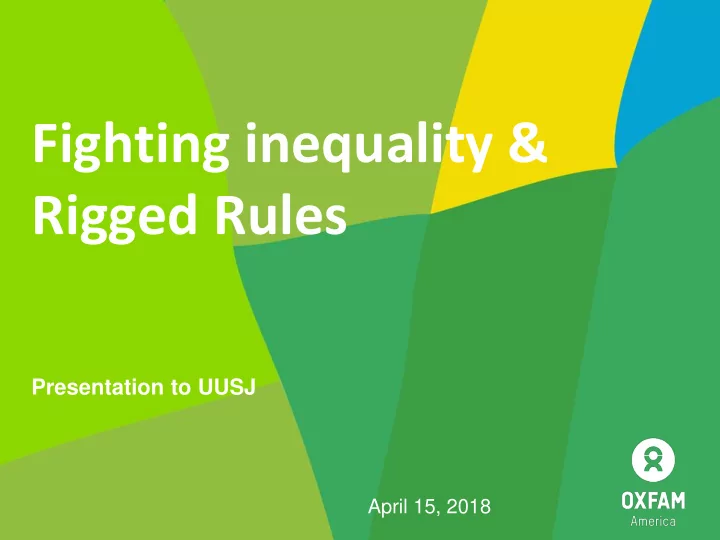

Fighting inequality & Rigged Rules Presentation to UUSJ April 15, 2018
Who is Oxfam? • Global anti-poverty and social justice organization • Active in more than 90 countries around the world • Founded in Oxford, UK to provide famine relief during World War II • Oxfam America founded in 1973, headquartered in Boston, with significant DC presence Page 2
Oxfam & Inequality • Global campaign launched in 2014 • Combat “rigged rules” that allow the rich and powerful to game the system • 4 pillars: • Living wage • End tax dodging • Public services (health + education) • End inequalities of gender, race, ethnicity, etc. Page 3
Reward work, not wealth h
Extreme Rewards to wealth • There are now 2043 billionaires worldwide with total net wealth on $7.7 trillion. Last year saw the biggest annual increase in billionaires in history, one more every two days. [Forbes, (2016 and 2017), Billionaires list, March 2017] • Between March 2016 and March 2017 billionaires saw their wealth increase by $762bn. This huge increase could have ended global extreme poverty seven times over. [Poverty data from World Bank based on 2013 estimated for extreme poverty gap at $1.90/day, calculated in local currency and converted to market dollars] • 82% of all wealth created in the last year went to the top 1%, while the bottom 50% saw no increase at all. [Credit Suisse, (2017), ‘Global Wealth Databook ’] Page 5
Page 6
TAX DODGING DRIVES POVERTY AND INEQUALITY WORLDWIDE Page 8
Goal: End corporate tax dodging Top-line goals are to push companies to: 1.Be more transparent about tax policy and practice 2.Align tax with actual economic activity 3.Use their political influence to support a more level playing field on tax Page 9
Research on 70 US Companies Seven sectors: Three issues: • Apparel • Climate change • Banks and Finance • Diversity & inclusion • Extractives • Tax reform • Food and Beverage • Pharmaceuticals • Retail • Technology Page 10
New oxfam report Page 11
KEY INSIGHTS: Climate change Climate change • 37 have publicly available climate change value statements • 33 made public statements supportive of addressing climate change • 23 made public statements supporting the Paris Climate Agreement Page 12
KEY INSIGHTS: Diversity & Inclusion Diversity & Inclusion • 67 have publicly availably diversity and inclusion value statements • 24 made public statements about President Trump’s Muslim travel ban (including all 10 technology companies) • 15 made public statements about immigration reform (including 9 technology companies) • 33 made public statements or joined an action to support LGBTQ issues • 18 made public statements or joined an action to support gender equality Page 13
KEY INSIGHTS: Tax reform Tax • 13 have a publicly available tax policy statement • 30 made a public statement about tax reform Page 14
Lobbying • The 70 companies in our list spent $281,466,163 to lobby Congress on 3,031 issues in 2017. • Collectively, they reported lobbying on climate change 19 times; diversity & inclusion 138 times; and tax 552 times. • They spent an estimated $1.5 million lobbying on climate, almost $11 million on diversity and inclusion issues, and almost $44 million to lobby on tax. Page 15
And then there is Tax Reform… • The return on investment for tax lobbying includes lowering the 70 companies’ tax bill by an estimated $313 billion on past offshore earnings alone compared to the tax rate when those earnings were made. • This does not account for additional corporate tax savings in other provisions of the 2017 tax reform. Page 16
Ultimately This is An unjust and unsustainable model... • At the bottom, workers have seen rights eroded, while at the top corporations are consolidating and put under huge pressure to deliver ever greater returns for wealthy shareholders. Corporations can use the mobility of their investments to force the race to the bottom on tax and wages. Page 17
… but one which can be transformed Regulate, restructure and redesign our economy and the way businesses are run: • Concrete, time bound targets and action plans to reduce inequality • Recognize and protect the rights of citizens and their organisations to freedom of speech and association • Eradicate the use of tax havens and ensure progressive taxes are raised • Publicly commit to achieving universal free public services and social protection floor Page 18
To end the inequality crisis, we must build an economy for ordinary working people, not the rich and powerful Page 19
Questions & Comments Robbie Silverman, Senior Advisor Private Sector Department, Oxfam America robert.silverman@oxfam.org
Recommend
More recommend